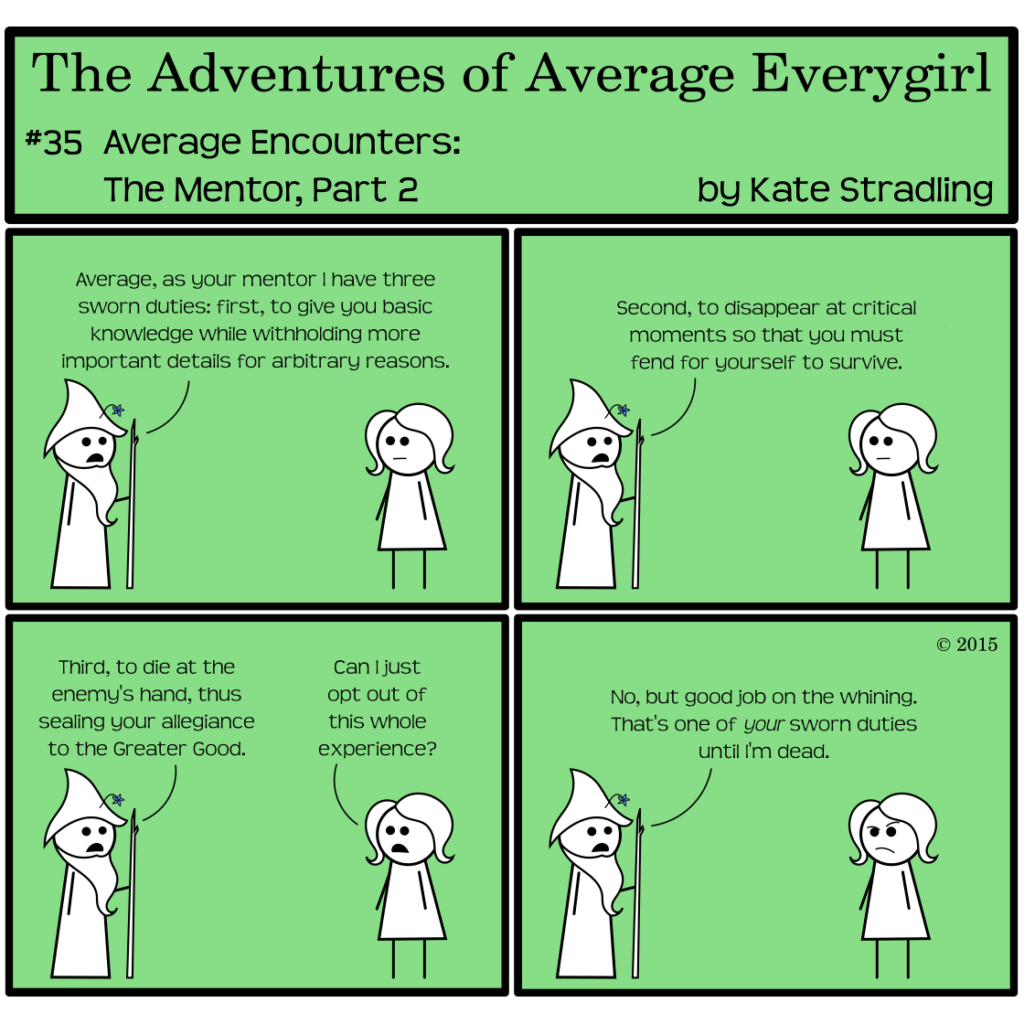
Sometimes the Mentor-Pupil relationship comes across more as trolling than education. Don’t get me wrong: I loves me some character manipulation. There should always be a purpose behind it, though, or it falls into the territory of contrived plot device rather than logical necessity.
As a disclaimer, I love the three mentors I’m about to skewer. They are wonderful characters. However, I sort of feel like they’re a bit sadistically manipulative at the same time. (And maybe that’s why I love them. Who knows.)
Also, a warning: Spoilers ahead, but not of anything recent. Proceed at your own peril.
Mentor Duty #1: Withholding Important Information
Poster Child: Dallben of Lloyd Alexander’s The Chronicles of Prydain.
This guy. Seriously. He’s raised Taran from infancy and has told him basically nothing. In fact, the fourth book in the series, Taran Wanderer, revolves around Taran’s search for himself. He wanders all over Prydain, seeking where he might have come from, what he’s supposed to do with himself, soul-searching, getting conned by people who take advantage of his ignorance, etc. He’s in love with a woman of noble birth, and he wants to discover whether he’s good enough for her. And he learns a ton of stuff and is a better person for it.
But freaking Dallben waits until the very last chapter of the fifth book to admit, “Yeah, I don’t know who your parents are. I found you hidden in a forest next to a battlefield where every other man, woman, and child was killed. You could be anyone’s kid.”
And yes, there’s some excuse about prophecies not turning out the proper way, but I never could see how this information would have derailed Taran’s choices or his life’s path. On the contrary, it could have given him greater confidence from the start, to know that his life was whatever he chose to make of it because he wasn’t beholden to titles or the lack thereof.
But then, half the angst of the series would vanish. Dallben’s strategic withholding of information serves its narrative purpose, but it also makes him look like kind of a jerk.
(But of course he doesn’t care, because he’s Dallben.)
Mentor Duty #2: Disappearing at Critical Moments
Poster Child: Albus Dumbledore of J.K. Rowling’s Harry Potter series.
“Look, children! There’s deadly peril at Hogwarts, but I, the all-powerful wizard, am going to vanish so that you twelve-year-olds can deal with it on your own!”
I know there were always reasons for Dumbledore not to be around when the plot took its nosedive into calamity, but I also feel like eliminating a genocidal maniac from the presence of school children kind of takes precedence over any other demands on one’s time. I mean, if Zombie Hitler somehow attached himself to the back of one of my school teachers’ heads, I’d hope my principal would intervene instead of sitting back like, “Yeah, let’s see how this plays out. The kids’ll be fine, I’m sure.”
The point of the novels, though, is Harry’s growth, not Dumbledore’s prowess. Thus Harry must be an agent who acts rather than an object or appendage to the action. From a narrative standpoint, his Wizened Mentor must fade away into the shadows for this to occur.
(But part of me is still like, “Really, Dumbledore? You’re letting kids risk their lives? Really?”)
Mentor Duty #3: Dying at the Enemy’s Hand
Hmm. So many to choose from here. Gandalf the Gray? Albus Dumbledore (again)? Abbe Faria? But I’m actually going to turn to film instead and go with my ultimate example of this trope.
Poster Child: Obi-Wan Kenobi of George Lucas’s Star Wars.
I was probably five years old the first time I saw these movies. (The originals. We’ll not speak of the others.) I still remember watching that scene where Obi-Wan is fighting Darth Vader and Luke runs into view of the pair of them. And Obi-Wan, that manipulative old goat, simply smirks, puts up his light saber, and gets hewn down on the spot.
It’s almost as if he’s been thinking to himself the whole movie, “How can I get this whiny kid to commit to the Good Side?” and in that moment, he’s like, “Bingo!”
And it works up until Luke learns that Obi-Wan withheld some pretty crucial information from him. But that’s a throwback to Duty #1.
At least Obi-Wan’s death has an emotional impact, though. I once read a book (that shall not be named) where the mentor died and the main character was blubbering over it, and I was sitting there going, “Why are you even sad? Can we please get on with this story already?”
That was not a good day.
Long story short, if the mentor has to die, make sure that everyone loves him like they love Gandalf, Dumbledore, Abbe Faria, Obi-Wan, etc.
(I’d include Dallben in that list, but he’s a combo-breaker, so cunning that he puts a secondary mentor in place to take that figurative bullet for him. RIP, Coll Son of Collfrewr.)